An Alabama Baptist college that is the last remaining all-women college in the state needs to raise $1.5 million in gifts and pledges in order to remain open for the spring semester, its president told alumnae and donors Dec. 15.
President Mark Tew wrote a one-page letter outlining the school’s dire financial situation. He said the school must obtain $500,000 in donations by Dec. 31 and another $1 million in unrestricted pledges to be fulfilled between Jan. 1 and May 31, 2021.
“Continued low enrollment over the past two decades has strained the College’s resources to the point that insufficient cash can be projected through the College’s normal revenue patterns,” Tew wrote.
As a result, the board of trustees has decided the school will have to close unless a new infusion of cash comes to the rescue.
“Without these extraordinary gifts, the College will not have sufficient cash to meet its operational responsibilities and will be unable to begin the spring semester,” Tew wrote. “If this happens, all students will be informed of transfer options to complete their degrees.”
The college was named after Ann Hasseltine Judson, the first female missionary from the United States to Burma, now known as Myanmar.
Judson is the fifth-oldest women’s college in the United States. It was founded by members of Siloam Baptist Church in 1838 and was named after Ann Hasseltine Judson, the first female missionary from the United States to Burma, now known as Myanmar. Ann and her husband, Adoniram, are revered among Baptists as the first missionaries sent from America to another land, sailing in 1812.
The college reports an enrollment of fewer than 300 students. It occupies a 118-acre campus in Marion, a small town located about 75 miles southwest of Birmingham. The school has been affiliated with the Alabama Baptist Convention throughout its history and currently receives $1 million annually from the convention.
According to its 2018 IRS filing, the school reported total revenue of $9.75 million in 2018, the latest year for available data. The school reported total assets of $32 million. One-third of its 2018 income derived from gifts and grants, with two-thirds coming from programs and services.
U.S. News and World Report in its college rankings database lists annual tuition as $18,540, which is much lower than the national average of $42,358. The school offers 20 academic majors, 22 minors and 10 pre-professional programs.
In a statement to The Alabama Baptist, trustee chairwoman Joan Newman, a 1973 graduate, said the board is “committed, individually and collectively, to the mission of Judson College. With her 182-year history, Judson has weathered many storms and become stronger and more determined to provide a quality Christian education. We continue to be impressed and reassured by the level of support and commitment from the legions of Judson alumnae and friends who support Christian principles. We welcome the financial and prayerful support of all concerned as we navigate through these challenges.”
Rick Lance, executive director of the Alabama Baptist State Board of Missions, said he and other state leaders “are praying for the Judson College family as its board of trustees deals with current financial challenges.”
President Tew said in addition to the urgent fundraising appeal, the trustees have authorized a study of how to address the complex needs of the college’s future beyond next semester.
While attending a women’s-only college is a rarity in American life today, it was a necessity in order to guarantee equal educational opportunities for women in 1838, the school’s website explains.
“In a time when women couldn’t vote, own property or gain custody of their own children, a group of visionary leaders in Marion, Ala., began making plans to build a school for women that would offer an education comparable to that received by men at Harvard and Yale. Judson’s founders understood that educating women would not only improve the lives of their students, but would also strengthen families, communities, churches and society as a whole,” the site says.
The school’s leadership believes there remains value for a women’s-only college today.
The school’s leadership believes there remains value for a women’s-only college today even though women have gained greater equality in access to education and employment.
“Young women are more likely to underestimate their academic ability, more likely to grow through honest dialogue with professors, and more likely to benefit from moving away from home for college than are young men,” the school’s website says. “Because of these and other differences, we believe that it is important to offer opportunities for young women to learn in a single-gender setting.”
Judson’s alumnae have been trailblazers and advocates in Alabama and beyond. Caroline Frances Smith, Judson’s first graduate in 1841, was known for her efforts to improve conditions for plantation and factory workers. Emera Frances Griffin, class of 1860, became a widely known women’s suffrage and temperance leader and the first woman to address an Alabama legislative body.
This is not the first time Judson College has faced imminent disaster. In the summer of 1947, Jewett Hall, the central building on campus, burned to the ground after a lightning strike. Administrators had only 50 days to erect temporary housing for students.
Alumnae pledged $100,000 and organized a campaign to sell bricks salvaged from the ruins. The new Jewett Hall was completed in 1951.
Related article:
What should it cost a denomination to control governance of a university?


